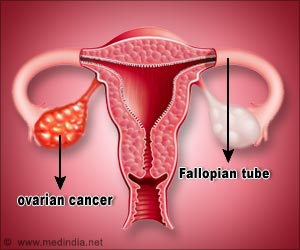For ovarian cancer, a new screening strategy appears to be highly specific for detecting the disease before it becomes lethal.

There currently are no established screening strategies for ovarian cancer. The disease often causes no specific symptoms and is difficult to detect in the early stages when it is most responsive to treatment. Therefore, ovarian cancer is highly lethal because most women have advanced disease when they are diagnosed.
Karen Lu, MD, of The University of Texas MD Anderson Cancer Center in Houston, led a team that tested the potential of a two-stage ovarian cancer screening strategy that incorporates changes in a blood protein called CA125, which is a known tumor marker. In their 11-year study, 4051 post- menopausal women initially underwent an annual CA125 blood test. Based on a calculation called the "Risk of Ovarian Cancer Algorithm," women were divided into three groups: those who should receive another CA125 test one year later (low risk), those who should receive a repeat CA125 in three months (intermediate risk), and those who should receive a transvaginal ultrasound and be referred to a gynecologic oncologist (high risk).
An average of 5.8 percent of women were found to be of intermediate risk each year, meaning that they should receive a CA125 test in three months. The average annual referral rate to transvaginal ultrasound and review by a gynecologic oncologist was 0.9 percent. Ten women underwent surgery based on their ultrasound exams, with four having invasive ovarian cancers, two having ovarian tumors of low malignant potential, one having endometrial cancer, and three having benign ovarian tumors. This equates to a positive predictive value of 40 percent for detecting invasive ovarian cancer. The specificity of the testing strategy was 99.9 percent, meaning that only 0.1 percent of patients without cancer would be falsely identified as having the disease. Importantly, all of the ovarian cancers were early stage.
The findings indicate that this screening strategy achieves high specificity with very few false positive results in post-menopausal women. "The results from our study are not practice-changing at this time; however, our findings suggest that using a longitudinal (or change over time) screening strategy may be beneficial in post-menopausal women with an average risk of developing ovarian cancer," said Dr. Lu. "We are currently waiting for the results of a larger, randomized study currently being conducted in the United Kingdom that uses the same Risk of Ovarian Cancer Algorithm in a similar population of women. If the results of this study are also positive, then this will result in a change in practice."
Source-Eurekalert













